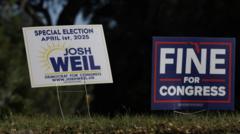The special election in Ocala, Florida, pits Democratic candidate Josh Weil against Republican Randy Fine for a pivotal congressional seat. Both candidates vie for crucial support amidst a charged political climate influenced by Donald Trump's agenda, reflecting broader national sentiments leading into the mid-term elections.
Florida Special Election Tests Political Waters Ahead of Mid-Terms

Florida Special Election Tests Political Waters Ahead of Mid-Terms
A special election in Florida's Ocala District evolves into a referendum on voter enthusiasm and political alignment as the mid-term elections approach.
In a strip-mall parking lot in Ocala on Monday evening, Democratic congressional hopeful Josh Weil painted a picture of potential victory as he rallied supporters, asserting that he could overturn a solidly Republican seat in an election that echoed far beyond local borders. "Their 2025 agenda stops here," insisted Weil, a public school math teacher, as he denounced President Donald Trump and his ally Elon Musk's perceived threats to government funding and employment.
On the Republican side, incumbent Randy Fine conveyed a similar urgency but from a defensive stance, warning through a telephone town hall that Democrats are determined to halt Trump's policy initiatives. With voters across central Florida heading to the polls to replace the departing Michael Waltz—who faced recent scrutiny after a private chat on U.S. military strikes was leaked—both candidates realize the stakes involved extend into the broader political arena.
Despite Wall Street expecting a Republican win in this heavily Trump-supported district, Weil’s fundraising prowess, with $10 million, starkly contrasts Fine's $1 million. Notably, Weil trails Fine in polling numbers, raising Republican apprehensions. "There's no excuse for a Republican not to win this race," asserted political activist Randy Ross, who linked enthusiasm on the ground directly to voter turnout.
As Republicans scramble to bolster support for Fine, high-profile endorsements have emerged, including Trump himself and key conservative figures like Ben Shapiro, who warned that losing this district could jeopardize Trump's legislative goals. Meanwhile, Musk's committee directed substantial funds to back Fine's campaign, demonstrating the Republicans’ commitment to the seat.
Both parties are aware that special elections in off-cycle periods typically favor candidates with stronger grassroots strategies. They offer a focused look at voter sentiments that could influence future congressional elections—the stakes have never felt higher. Should Weil emerge victorious, it could significantly shift the House balance, projecting confidence among Democrats while amplifying Republican concerns.
As the race tightens, both parties spin narratives to their advantage; Republicans downplay the implications of a potentially close contest, while Democrats see any close result—or better yet, victory—as validation of their resurgence. "These are races that should not, under ordinary circumstances, be on anyone's political radar," remarked Democratic House Minority Leader Hakeem Jeffries, hinting at the broader narrative surrounding voter interests and party loyalty in this pivotal election cycle.
In a climate fraught with emotion and stakes, the Ocala seat will serve as a litmus test for the political mood ahead of next year's mid-term elections. Past special elections have foreshadowed broader trends, and today's results could carry significant implications for both parties as they navigate the turbulent waters of shifting voter sentiment and political loyalty in an ever-evolving landscape.
On the Republican side, incumbent Randy Fine conveyed a similar urgency but from a defensive stance, warning through a telephone town hall that Democrats are determined to halt Trump's policy initiatives. With voters across central Florida heading to the polls to replace the departing Michael Waltz—who faced recent scrutiny after a private chat on U.S. military strikes was leaked—both candidates realize the stakes involved extend into the broader political arena.
Despite Wall Street expecting a Republican win in this heavily Trump-supported district, Weil’s fundraising prowess, with $10 million, starkly contrasts Fine's $1 million. Notably, Weil trails Fine in polling numbers, raising Republican apprehensions. "There's no excuse for a Republican not to win this race," asserted political activist Randy Ross, who linked enthusiasm on the ground directly to voter turnout.
As Republicans scramble to bolster support for Fine, high-profile endorsements have emerged, including Trump himself and key conservative figures like Ben Shapiro, who warned that losing this district could jeopardize Trump's legislative goals. Meanwhile, Musk's committee directed substantial funds to back Fine's campaign, demonstrating the Republicans’ commitment to the seat.
Both parties are aware that special elections in off-cycle periods typically favor candidates with stronger grassroots strategies. They offer a focused look at voter sentiments that could influence future congressional elections—the stakes have never felt higher. Should Weil emerge victorious, it could significantly shift the House balance, projecting confidence among Democrats while amplifying Republican concerns.
As the race tightens, both parties spin narratives to their advantage; Republicans downplay the implications of a potentially close contest, while Democrats see any close result—or better yet, victory—as validation of their resurgence. "These are races that should not, under ordinary circumstances, be on anyone's political radar," remarked Democratic House Minority Leader Hakeem Jeffries, hinting at the broader narrative surrounding voter interests and party loyalty in this pivotal election cycle.
In a climate fraught with emotion and stakes, the Ocala seat will serve as a litmus test for the political mood ahead of next year's mid-term elections. Past special elections have foreshadowed broader trends, and today's results could carry significant implications for both parties as they navigate the turbulent waters of shifting voter sentiment and political loyalty in an ever-evolving landscape.





















